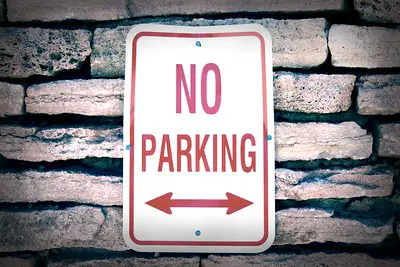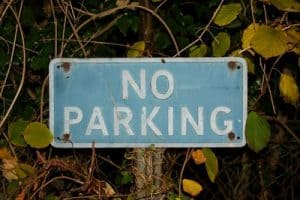Space poachers are a nightmare everywhere. If you’ve ever returned home from work and found a stranger’s car parked right in front of your home, you know how irritating it can be.
Maybe you tried to come-off the space (imagine having to reserve the parking space in front of your own home!), but the cones ended up stolen.
There are even neighbors who would leave their sizeable garages empty just to park in front of your home. It is just a level of stress that should never exist.
So, Can You Put A No Parking Sign In Front Of Your House?
Well, it is perfectly OK to put a notice in front of your property advising everyone to avoid parking their cars in front of your home – just don’t be profane, offensive, or violate any other law while putting up the sign. However, just because it is stuck there doesn’t mean everyone is obliged to adhere to your directions.
It can be a bag of lemons and oranges – in most jurisdictions, you can’t legally stop anyone from parking in front of your home, more so if you live in a neighborhood, but the sheer presence of these signs can work at times.
When they work, it is mostly an act of courtesy, not because the other guy is scared of legal repercussions. Basically, you are not really entitled to the space in front of your home.
Related: Can You Put Traffic Cones in Front of Your Driveway?
3 Common Arguments
Here are some of the commonly used arguments to make it look like the homeowner is entitled to all the space in front of their homes:
1. ‘I pay taxes’
“I pay a lot of taxes on my property, probably more than you do, why should I park down the driveway away from my home?” This is one of those arguments that don’t hold the water both by the sheer sound of it and practicality. It’s true you are paying taxes for your property, so is everyone else.
2. ‘It carries no actual force of law’
This is true – no motorist has a legal obligation to leave an empty space in front of a private home when parking their car. The law does not recognize you as the owner of the space in front of your home.
If you reported this “violation” i.e. someone parking their car in front of your home – whether you choose to report to the police or the local parking authority, it doesn’t matter – you are more likely to be told to reach out to the “offending” motorist and working out the issue.
3. ‘We don’t want confusion’
Sometimes it is hard to know who is a real resident of the neighborhood and who isn’t.
If a non-resident takes advantage of free parking in your neighborhood by leaving the car in front of your home and picking it in the evening once in a while, you wouldn’t know until you get to the bottom of it.
Adding a notice in your gate may be a great way of warding them off although it is rarely effective for habitual space poachers.
Another confusion stems from neighbors who don’t really understand the part of the driveway that they would qualify to use even if they really don’t own it.
It wouldn’t surprise you to find your neighbor’s car parked in front of your home, especially if their garage has to accommodate two cars and the only free space they could see is your gate.
It can be hard to tell a close neighbor to stay clear of your parking place, but one of the best approaches can be to stick a polite notice advising them and other residents otherwise.
The effectiveness of the sign
It can depend on your community, but people tend to respond to these printed signs as mainly positive. Many homeowners who stick it on their gates report reduced cases.
However, the sign can still be interpreted as menacing, especially when your words start sounding like a threat, warning, or outright profane.
Just a fistful of people would take you seriously if you include some swear words on the sign.
The problem is the wording can look menacing even when you don’t intend – very much like interpreting a heavily tattooed guy as a threat when he’s nothing but a huge teddy bear.
Technicalities
Issues arising from parking slots in residential areas tend to lie in a legal grey area because some residential areas have their own laws guarding how residents interact.
In some places, it may be a legal loophole that renders the police ineffective to offer any useful assistance.
There are a few things to bear in mind though – parking in front of someone’s home can be illegal in some circumstances. These circumstances may give your “DO NOT PARK HERE” sign some legal muscle.
What If A Total Stranger Is The Culprit?
In the situation of a complete stranger parking their car on your driveway or right in front of your gate, issues tend to arise when a line drawn between the civil law and criminal law is blurred.
If a vehicle is parked on the road that leads to your driveway in such a way that your access to the driveway is blocked, the police may be justified to issue a fine.
But once the vehicle moves from the road to your own drive, it is technically considered to be on private property – even local councils have no jurisdiction over issues from its presence there.
Local councils are only allowed to remove abandoned vehicles from public property; they would only remove cars abandoned in private properties in special cases.
There are three types of cars the local council may not tow away:
- Taxed vehicle
- Insured vehicle
- A vehicle with valid MOT
Although the police will acknowledge that the vehicle was trespassing, they will classify the case as a civil offense, which would mean they’ve dropped it too low down too low on their priority list. This way, only an eviction letter from a court of law would compel the owner of the car to remove
What if the golden rule fails?
The golden rule is based on the assumption that other motorists will see the sign you stick in front of your home and be courteous enough to do things as you say – stop parking in front of your home.
It does work sometimes, but there are those moments some people would ignore the sign and still leave their vehicles on your gate. What do you do in such a case? There are two alternatives:
1. Talk to them
If you came to the realization that only a specific neighbor or someone you know keeps taking over “your” space, call them aside and let them know how badly you need it.
2. Convince the council to designate the space as yours
If you are disabled or you feel you are the only one who can use a certain parking slot on the driveway, consider designating it as so. You might need to provide proof either to the local community or any other authority responsible for managing the properties in your area.
In a Nutshell – Putting a “No Parking” Notice In front of Your Home
A resident is allowed to put a sign on the gate or anywhere in front of their homes advising motorists to avoid parking in front of the house.
Most jurisdictions don’t have laws compelling the members of the public to comply with the demands on your sign. If they choose to ignore it, there is nothing you can do – reporting to the local police or council would be futile.
In most cases, the sign is written and left on the gate hoping that the motorists will show some courtesy and leave avoid parking in front of your home
The reason why you can’t enforce your notice is the grey area occupied by laws that don’t explicitly address this common annoyance. Technically, the driveway and the area in front of your home is part of the public property, so anyone is free to use it.
If the offending motorists went too far to park the car right on your own drive, the police and the local parking authority may step in and tow the car away if you report.
Also, if the motorist blocks the main road that feeds into the driveway, the police may be within their mandate to issue a penalty.
Conclusion
You can put the sign in front of your asking people not to park their cars in the available. However, there is no legal requirement for anyone to do what the sign says.
This is because the driveway and the space in front of your home are not recognized as personal property. Unless the vehicle is parked right on the drive of your home.
However, the effectiveness of a written sign can depend on your language (profane signs almost never works), the laws set by the local council and, and the willingness of the users to be courteous enough to understand that you deserve the space in front of your house.


